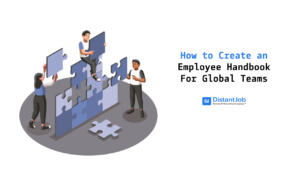What is Remote AID?
Running Remote is the world’s largest remote work conference that gathers remote leaders who teach and share their experiences about building and managing distributed teams. Yet, this year’s conference had to be postponed until September due to COVID-19.
However, Running Remote organized a free online charity event called Remote Aid 2020 on the 20th of April. This event was with the sole purpose of providing information and support to all companies, employees, and managers who are struggling to work from home.
Communication in Remote Teams
Companies all over the world have been forced to work from home due to the COVID-19 Pandemic. Many teams with no remote experience have been struggling to keep everything afloat without achieving any results. And one of their current issues is on how to communicate effectively.
Remote AID 2020 gathered in a discussion panel:
- The one and only Sharon Koifman, Founder and President of DistantJob.
- Stacy Elliott, Sr Director of Executive Communication at Microsoft.
- Chatri Ali, Chief Operating Officer at ReCharge.
The discussion panel was conducted by Ryan Malone, Founder, and CEO of SmartBug Media. He proposed three topics that were discussed by the group of experts, all regarding communication in remote teams.
#1 Communication Challenges in Remote Teams
Onsite companies interact in different ways. Whether it’s traditional meetings, chit-chatting in coffee rooms, or popping into someone’s office, it takes standing in the building to hear all the office noise to realize there’s a lot of interaction going on.
In remote teams, things are much different. Teams are distributed in different parts of the world. Besides managing different time zones, leaders also need to create communication strategies to avoid misunderstandings, establish relationships, and to make work possible.
In the Remote AID 2020 discussion panel, the three remote leaders agreed that one of the main challenges for companies that did not have any remote experience before COVID-19 is creating clear communication guidelines. How is communication going to take place? How are you going to establish relationships?
Besides sharing his advice on how to communicate effectively, Sharon Koifman shared a different perspective about communication. He emphasizes that the central role that communication has in a remote company is in building culture. Culture is not only about defining the goals and objectives that everyone must aim for.
[bctt tweet=””Culture is about creating a connection so you have better teamwork and people are connected better. And all that comes with better communication.”” username=”DistantJob”]
#2 How do Managers Adapt Their Communication in Order to be Successful
One of the main reasons why remote work is so successful besides increasing productivity and employee retention is that it grants both employees and employers the possibility of having flexible schedules.
Working every day from 9 am to 5 pm at an office doesn’t mean you work in those hours. Sometimes it means you space out for 3 hours, chat with Bob for another hour, and have plenty of meetings.
None of this happens when you work from home. You decide which schedule fits you the best to be more productive (besides attending the necessary meetings) – Whether it’s staying up late or waking up early in the morning.
Remote leaders are aware that their employees are in different parts of the world and, besides having their work, they also have a life. And many of them are struggling because of the quarantine situation. It’s not only about productivity but also about caring for their well being.
Stacy Elliott shares how they handle successfully remote teams at Microsoft:
[bctt tweet=””Just ensuring that you’re respectful and checking in, asking if people are okay, how are they doing, but also being respectful of their time.”” username=”DistantJob”]
#3 Impact COVID-19 Could Bring Through Remote Work
No one knows with certainty what will happen in the future. Will remote work adoption grow at full speed? Or will employees prefer to continue commuting 2 hours to get to their office?
There are too many different opinions on this. On the one hand, some onsite employees are hating working from home due to the circumstances. Quarantine and having to change their whole routine overnight is not easy for anyone. Yet, other companies have been very successful at adapting to these changes; Twitter is one of them.
Chathri Ali is convinced that remote work, even though it has been a challenge for many teams, it’s shifting the future of work. She shares:
[bctt tweet=””We all should be thinking about the next normal. What’s next? Because I think that’s going to be truly how we all connect and collaborate in the future.”” username=”DistantJob”]
Maybe not most companies will make the full transition, but they might undoubtedly change the way they use to collaborate and start going increasingly digital.
Are you Struggling to Manage Your Team?
If that is the case and you have unanswered questions, we encourage you to participate in the next REMOTE AID 2020 free online event that will be in June.
And of course, as a remote recruitment agency besides headhunting the best IT talent in the world, we want to help you manage your team.



